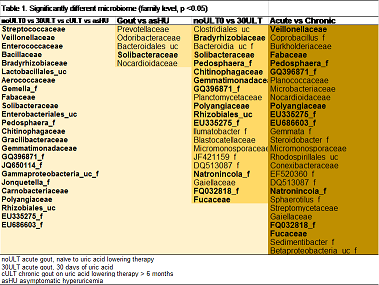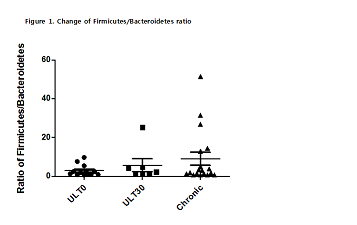Session Information
Session Type: ACR Poster Session C
Session Time: 9:00AM-11:00AM
Background/Purpose: Accumulating evidence indicates that gut microbiota interact with gout but it is still unknown how the uric acid lowering treatment (ULT) affects to the gut microbiome. This study was performed to investigate the effect of ULT on gut microbiome composition.
Methods: Stool samples from asymptomatic hyperuricemic patients (asHU, n = 3) and three groups of gout patients, i.e. a group of acute gout patients before ULT (noULT, n = 14), a group of gout patients after the 30-day-ULT (30ULT, n = 9) and a group of chronic gout patients having the > 6-month-ULT (cULT, n = 18), were collected and analyzed using 16S rRNA gene-based pyrosequencing. The composition of gut microbiota and the abundant phylogenetic types were evaluated.
Results: Firmicutes/Bacteroidetes ratio in the cULT group was higher compared to those in noULT and 30ULT groups. We identified four robust enterotypes, which was affected by ULT. For the 30ULT group, proportion of patients with Bacteroidaceae dominant gut type were reduced and we observed enhanced prevalence of Ruminococcacea-Prevotellaceae dominant gut type than in the noULT group. Ruminococcacea-Prevotellaceae dominant gut type in the cULT group was not enriched as in the 30ULT group. In any group of gout patients, notable bacterial families presented significantly differed proportions: Veillonellaceae, Pedosphaera_f, GQ396871_f, Polyangiaceae, EU335275_f,Natronincola_f, FQ032818_f,Fucaceae in family level and Bradyrhizobium, Natronincola_f_uc_s, Lactobacillus casei group and DQ905770_s in species level.
Conclusion: This study suggest that fecal microbiome may change after ULT in gout patients. Further research is warranted to uncover the potential links between the specific microbes and uric acid processing in human intestine.
Figure 1. Change of Firmicutes/Bacteroidetes ratio
To cite this abstract in AMA style:
Kim HW, Yoon EJ, Jeong SH, Park MC. The Effect of Uric Acid Lowering Treatment on the Microbiome in Gout Patients [abstract]. Arthritis Rheumatol. 2017; 69 (suppl 10). https://acrabstracts.org/abstract/the-effect-of-uric-acid-lowering-treatment-on-the-microbiome-in-gout-patients/. Accessed .« Back to 2017 ACR/ARHP Annual Meeting
ACR Meeting Abstracts - https://acrabstracts.org/abstract/the-effect-of-uric-acid-lowering-treatment-on-the-microbiome-in-gout-patients/


